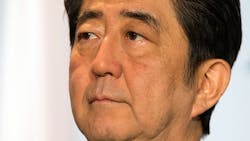Japan Factory Output Rises for First Time in Three Months
TOKYO --Japan on Monday posted its first factory output expansion in three months, official data showed, offering some rare good news after a string of weak figures threw cold water on recovery hopes.
The upbeat figures -- a 3.7% rise on-month in January -- comes as investors look for clues about the state of the world's number three economy.
Disappointing inflation numbers last week stirred speculation the Bank of Japan will have to unleash more monetary easing to boost prices and growth.
Japanese businesses have remained cautious over investing in their businesses and offering significant wage increases, citing the uncertain outlook.
The once-powerhouse economy shrank in the October-December period, Japan's second quarterly contraction in 2015.
The bad news stretched into January when the country swung back into a trade deficit as exports to key market China plunged, dealing another blow to Prime Minister Shinzo Abe's bid to kick-start the economy.
"It's sign that production is improving, albeit at a slow pace," Hidenobu Tokuda, senior economist of Mizuho Research Institute, said of the industrial production figures.
"But the export trend is still not very strong given the downside risks for the global economy... If the.U.S. economy picks up, that will help Japanese exports."
Slowing global growth, particularly in number two economy China, and a slump in oil prices have seen financial markets suffer one of their worst starts to the year in living memory.
Some predicted Japan's positive industrial production figures will not last, as separate data on February 29 showed retail sales fell slightly more than expected last month.
"The rebound in industrial production in January is unlikely to assuage concerns about the health of Japan's economy," Marcel Thieliant from research house Capital Economics said in a commentary.
"This jump in activity should be reversed soon."
Last month, central bank policymakers shocked markets by resorting to an unprecedented negative interest rate policy, which aims to boost lending by penalizing banks for storing excess reserves in the BoJ.
The move was widely panned as a desperate bid to counter Japan's slowdown after earlier monetary easing efforts failed to cement a sustained recovery in the economy.
With his growth program limping along and the BoJ struggling to hit an ambitious two-percent inflation target, Abe must decide whether to follow through with another sales tax hike next year.
The rise is seen as crucial to containing Japan's massive national debt, but it could dent consumer spending and hurt an already fragile economy. A consumption tax hike in 2014 pushed Japan into a brief recession.
Abe's program was also shaken by the bloodbath on equity markets at the start of this year and a resurgent yen, which threatened to dent companies' overseas profits.
A poll published on February 29 by the leading Nikkei business daily found 50% of voters do not approve of Abe's growth plans, against 31% who are in favor. That is the largest percentage of naysayers since February last year.
Copyright Agence France-Presse, 2016
About the Author
Agence France-Presse
Copyright Agence France-Presse, 2002-2025. AFP text, photos, graphics and logos shall not be reproduced, published, broadcast, rewritten for broadcast or publication or redistributed directly or indirectly in any medium. AFP shall not be held liable for any delays, inaccuracies, errors or omissions in any AFP content, or for any actions taken in consequence.
